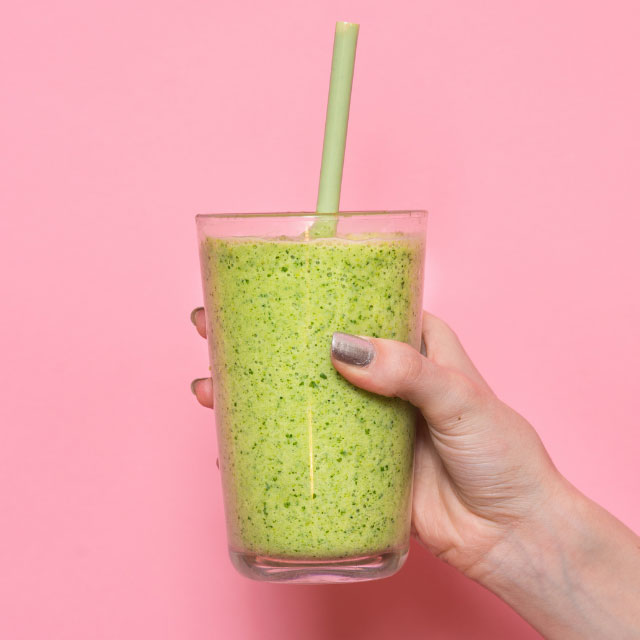
Accredited Practising Dietitian, Nutritionist and Founder of Dietitian Edition dietitianedition.com, Millie Padula shares her top tips to delicious smoothie success…
Whoever invented smoothies, oh and smoothie bowls (we can’t forget those), deserves some sort of large merit award. What a genius!
Smoothies can be a powerful vehicle for an abundance of nutritious ingredients, all blended up into a convenient and satisfyingly delicious beverage. What is not to love about that?
Being conscious of the types of ingredients you throw into your blender is incredibly important if you want to get the most nutrition out of your smoothie.
Not sure how to ensure your smoothie is nutritional balanced? Don’t worry – I’ve got you!
I’ve created this simple guide for you to follow. Picking an ingredient from each category below will guarantee a nutritionally complete, satiating beverage. Try it for yourself and thank me later!
How to build a balanced smoothie
1. Lure in the liquid
Don’t consider this step lightly, it’s incredibly important. Sparing a thought for your smoothie base can make or break its nutritional success.
If you are enjoying your smoothie as a snack or a lighter meal consider a hydrating liquid like coconut water. Coconut water is great because it contains a variety of electrolytes which help to prevent dehydration and that’s a really important factor for us to consider, especially in the warmer months.
2. Pick your protein
Adding protein into smoothies, or any meal and snack for that matter can help to keep us fuller for longer. Our bodies break down protein relatively slowly which helps to control our appetite and keep cravings at bay.
You can find protein in yoghurt (if you opt for a natural variety, you will get the added gut- loving probiotic benefits too), nut or seed butter, chia seeds and even silken tofu. You read correctly, tofu is becoming a really popular ingredient to add into smoothies because it is relatively tasteless and adds a huge punch of plant protein.
If none of the options mentioned above tickle your tastebuds, choosing to incorporate a protein powder into your smoothies can help to boost the protein content. Look for a natural variety that is free from artificial sweeteners and additives.
3. Slap in the slow burning carbs
Carbohydrates are our bodies major energy source, so it makes sense that we need to allow for them in our meals and snacks. If you are choosing a smoothie as a pre or post workout option, it’s really important to consider your carbohydrate intake.
You can find carbohydrates in foods such as rolled oats, fresh or frozen fruit (both are just as nutritious), nut butters and yoghurt.
4. Fit in all the fibre
I could talk about fibre all day, seriously – I’m not exaggerating. Fibre plays a key role in keeping our digestive systems healthy. Our healthy gut bugs thrive off fibre, so without it we are quite literally starving the beneficial microbes that live in our digestive tract. Fueling our gut appropriately plays a key role in our immune strength and mental health and reduces disease risk.
My favourite way to add fibre into smoothies is through fruits (of course!) and vegetables. Leafy greens such as spinach and kale are great and don’t hold much potency – you won’t even know they’re there. Greens in particular provide an abundance of fibre and energy boosting iron too.
The main reason smoothies are nutritionally superior to juices is because the fibre intake is generally higher. This is because blending fruits and vegetables as opposed to compressing them through juicing retains most of the fibre. Bonus tip – keep the skin on fruits such as apples to increase the fibre even more!
5. Don’t forget the fats
Lastly, we need to talk about fats! Like protein, fats help to keep us fuller for longer.
Omega 3 essential fatty acids in particular play a key role in the health of our heart and brain. You can find these types of fats in chia seeds, walnuts, linseeds and hemp seeds. Other wonderful sources of healthy fats include avocado and nut/seed butters.
My fave smoothie based on the guide above:
1 cup of calcium-fortified plant-milk (Raw C’s unsweetened calcium boosted coconut milk is a great option!) or 1 cup of coconut water
200g of natural Greek yoghurt. If you’re avoiding dairy, opt for a plant-based yoghurt or a scoop of vegan protein powder
3 tbsp of rolled oats
1 banana and 1/2 cup of spinach
1 tbsp of chia seeds OR 1 tbsp of peanut butter

